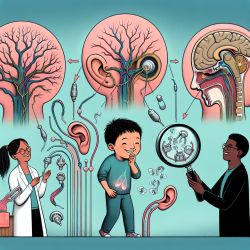Introduction
As practitioners in the field of speech-language pathology, understanding the nuances of auditory nerve fiber degeneration and its implications for cochlear implant (CI) performance is crucial. Recent research, specifically the study titled "Dendritic Degeneration of Human Auditory Nerve Fibers and Its Impact on the Spiking Pattern Under Regular Conditions and During Cochlear Implant Stimulation," offers valuable insights that can enhance our approach to therapy and improve outcomes for children with hearing impairments.
Key Findings from the Research
The study utilized computational models to simulate the effects of dendritic degeneration on auditory nerve fibers (ANFs) and evaluated the performance of cochlear implants under these conditions. Here are some critical findings:
- Multimodal Distribution of Dendrites: The research found that control dendrite diameters exhibited a unimodal distribution, while hearing loss cases showed a multimodal distribution. This suggests that degeneration leads to a variety of dendrite sizes, impacting neural signaling.
- Spike Latency and Jitter: Thinner dendrites, although easier to excite, showed increased spike latency and jitter due to reduced conduction velocity. This affects the timing of neural signals, crucial for auditory processing.
- Impact of Myelination: Variations in myelin thickness had a smaller impact on spiking performance compared to dendrite diameter, indicating that dendritic health is a more significant factor in neural signaling efficiency.
- Cochlear Implant Stimulation: CIs create multiple spike initiation sites along the dendrite, soma, and axon. The study found that dendrite degeneration increases the threshold currents required for effective CI stimulation.
Implications for Practitioners
Understanding these findings can guide practitioners in tailoring interventions for children with cochlear implants. Here are some practical applications:
- Personalized Therapy Plans: Recognizing the diversity in dendritic health among children can help in designing personalized therapy plans that consider individual neural signaling capabilities.
- Monitoring and Adjusting CI Settings: Regular monitoring of CI performance and adjusting settings based on neural health can optimize auditory outcomes.
- Advocating for Comprehensive Assessments: Encourage comprehensive auditory assessments that include evaluations of dendritic health to better predict CI outcomes.
Encouraging Further Research
While this study provides significant insights, it also highlights the need for further research. Practitioners are encouraged to stay updated with ongoing research and consider participating in studies that explore the intricate relationships between dendritic health, neural signaling, and cochlear implant performance.
Conclusion
By integrating the findings from this research into clinical practice, practitioners can enhance their skills and contribute to better outcomes for children with hearing impairments. Understanding the impact of dendritic degeneration on neural signaling and CI performance is a step towards more effective interventions.
To read the original research paper, please follow this link: Dendritic Degeneration of Human Auditory Nerve Fibers and Its Impact on the Spiking Pattern Under Regular Conditions and During Cochlear Implant Stimulation.










